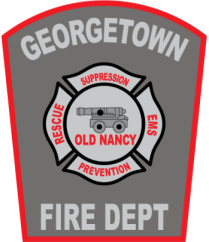GEORGETOWN — Chief Matt McKay and the Georgetown Fire Department would like to remind Georgetown residents that open burning season begins Jan. 15 and runs through May 1. A permit is required to open burn in compliance with Massachusetts law.
Permits:
Residents can begin applying for a burn permit today by creating an account via the department’s new burn permit portal: Georgetown.firepermits.com The cost of the permit is $10. Payment should be made online with a credit or debit card or by electronic check. If payment is not made online, a check or money order (made out to the Town of Georgetown) must be submitted to the Georgetown Fire Department prior to the approval of the burn permit.
Residents will receive an email notifying them when the permit is approved, following receipt of payment. On any day that a resident plans to burn the permit must be activated by visiting their Georgetown.firepermits.com account. When a burn is activated the department’s dispatch is able to quickly view the location of the open burn, which will assist in public safety and emergency management this burn season.
If conditions are unsafe for burning, such as high winds or drought, a notification will be posted on the homepage and the system will prevent an individual from activating a burn permit.
Individuals who don’t have access to a computer should call the Georgetown Fire Department at 978-352-5757 for assistance with their burn permit application.
Open Burning:
Burning must be done:
- Between 10 a.m. and 4 p.m., from Jan. 15 to May 1
- At least 75 feet from all buildings
- As close as possible to the source of material being burned
Residents are allowed to burn:
- Brush, cane, driftwood and forestry debris (but not from commercial or industrial land clearing)
- Agricultural materials including fruit tree and bush prunings, raspberry stalks, and infected bee hives for disease control
- Trees and brush from agricultural land clearing
- Fungus-infected elm wood, if no other acceptable means of disposal is available
Residents may not burn:
- Leaves
- Brush, trees, cane or driftwood from commercial or industrial land clearing
- Grass, hay, leaves, stumps or tires
- Construction materials or demolition debris
- Household trash
What times are best for open burning?
- You can help prevent wildland fires by burning early in the season. Wet and snowy winter conditions help hinder the rapid spread of fire on or under the ground.
- Changing weather conditions and increased fire danger in spring can lead to many days when open burning is not allowed.
- April is usually the worst month for brush fires. When snow recedes, but before new growth emerges, last year’s dead grass, leaves and wood are dangerous tinder. Winds also tend to be strong and unpredictable in April.
For more information on open burning in Massachusetts, visit Mass.gov.
###

